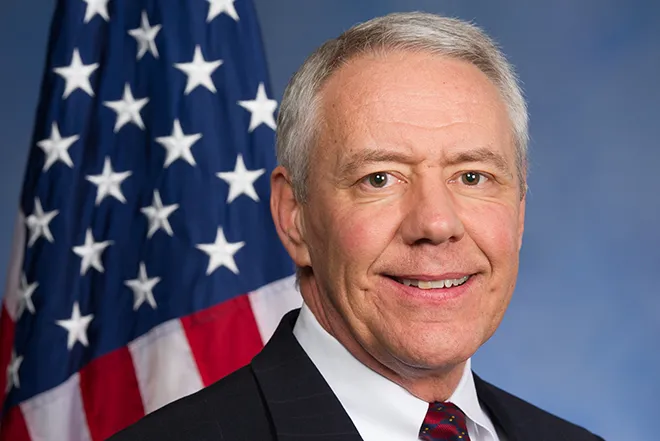
Nebraska leads with new veteran justice program, aiming to steer veterans back to ‘hero status’
(Nebraska Examiner) A national panel of senior military and criminal justice leaders is hailing Nebraska landmark legislation that they say could help restore justice-impacted veterans to “hero status.”
Nebraska state lawmakers voted 44-0 in April to approve Legislative Bill 253 and create new veteran justice programs statewide, beginning July 1, 2025. Such programs would include evidence-based treatment and case plans for eligible veterans that would specifically address military service-connected conditions that contributed to criminal offenses.
Former U.S. Defense Secretary Chuck Hagel, chair of the Veterans Justice Commission of the Council on Criminal Justice, and a former U.S. senator from Nebraska, said he’s proud Nebraska is the first state to adopt recommendations from the 15-member commission.
“I’m not surprised that Nebraska would be leading the way of all the states in this,” Hagel said.
Nebraska leads the way in legislation
Hagel, who served in Vietnam, said he learned growing up how there was a World War II veteran in nearly every house in Nebraska and it was evident Nebraskans appreciated their veterans.
The commission has outlined state-level and federal recommendations, with Nebraska being the first state to adopt legislation based on the commission’s policy framework. State Senators Tom Brewer, Justin Wayne and Lou Ann Linehan ushered it through the Legislature this year.

© iStock - ethanfink
Brewer, a military veteran of 36 years, led LB 253 alongside Wayne, chair of Nebraska’s Judiciary Committee, and Linehan, a former campaign manager and chief of staff for Hagel in Congress.
Hagel said the legislation calls attention to an often overlooked issue: the transition from active duty to civilian life, a transition that more than 200,000 active-duty members make each year. Difficulties in making that shift have been exacerbated after the country’s two longest wars, in Afghanistan and Iraq, he added.
“Because of an all-volunteer force, the same people kept going back and back and back,” Hagel said. “It wasn’t unusual to find veterans who had four or five, six tours in Iraq and Afghanistan.”
Brewer, who has two Purple Hearts, is one such veteran. His service included six tours in Afghanistan. He’s also made multiple volunteer trips to support Ukraine, including this month.
Brewer described the legislation as supporting combat-impacted veterans who have made mistakes but who should be treated with respect because of their service to the country.
“Many times that exposure causes issues that they would not normally have in their lives, therefore that’s why their treatment should be uniquely different,” Brewer said in a text. “But it’s not a free ride — if you wanna make mistakes and continue to make mistakes, you will have a harder life than others.”
Civilian life ‘a whole different world’
Hagel said simply that the “transition process is not good” and noted that many service members enlist in their teens and get out 20 years later.
“We could derail a lot of these veterans from getting in trouble with the law or going to jail if we had that upfront transitioning help,” Hagel said.

His commission has aimed to replicate the veteran justice program in other states and aimed higher for congressional and federal action, with Hagel tapping into connections with former U.S. Senate colleagues and federal leaders.
One goal is a U.S. Department of Defense undersecretary whose job would be easing the process of transitioning from military service to civilian life.
“One day you’re in a uniform and you’ve had your years and years of being in an institution where there’s structure that you worked hard in, that you admire and you respect,” Hagel said. “And all of a sudden, you’re out — it’s a whole different world.”
According to the Council on Criminal Justice, roughly one in three veterans report being arrested or booked in jail at least once. The suicide rate for veterans is approximately 1.5 times higher than the rate among the general population and even higher for veterans after incarceration.
Under Nebraska’s legislation, all criminal courts — not just specialized courts, which have been established in four of Nebraska’s 93 counties — could consider whether there is “clear and convincing evidence” that a condition related to military service contributed to a criminal offense.
Returning to ‘hero status’
In 1997, Nebraska approved problem-solving courts and expanded them in 2016 to include Veterans Treatment Courts. These are 18- to 24-month intervention programs similar to the new policies advanced this year.
Across the country, 14 percent of counties operate similar, specialized veterans courts, though eligibility requirements exclude many veterans.

© iStock - flySnow
“The Veterans Justice Commission wanted an alternative to complement Veterans Treatment Courts, and that’s what this model policy does,” Jim Seward, commission director, said.
Seward said Nebraska has more than 200 veterans in its correctional system. He said it’s hard to say how many fewer would still be sitting in prison had the new law been in place sooner.
“But I would venture to guess somewhere in the neighborhood of half of them would have been considered for this more intensive, evidence-based treatment program,” Seward said.
Seward said every criminal judge in Nebraska, from Alliance or Scottsbluff to Nebraska City, could recognize a defendant’s veteran status and determine whether there is a connection to the alleged crime.
“If the judge decides that it is, they have this opportunity to build a therapeutic treatment plan for the individual, partnering with the VA and vet centers and all the resources that that brings to bear … to really try and help that veteran get back to what we like to say, ‘hero status,’” Seward said.
“They came home a hero — something went wrong,” Seward continued.
Minnesota passed similar legislation a few years ago, Seward said, but before the Veterans Justice Commission developed the policy framework.
Program parameters
Under the Nebraska bill, veterans are not eligible if their alleged offense is ineligible for probation, or in other select circumstances, such as if someone died as a result of the alleged crime or if the offense would qualify someone for the Sex Offender Registry.
If necessary for public safety, a veteran might still receive a prison sentence.
If eligible, a veteran’s case plan would be developed with court probation and appropriate experts and would:
Include input from the veteran.Assess specific risks and needs, including whether there is a risk of intimate partner violence.Set clear and individualized goals, such as rules, consequences and incentives.
Veteran service status could be used as a mitigating factor but not an aggravating one in determining a sentence. Victims or alleged victims would need to be notified of program eligibility and could request to be part of the veteran’s restorative program.
Nebraska’s state court administrator will record how many veterans receive, decline or are denied participation in the program and will track the outcomes of those who are approved.
An annual report will be issued to the Judiciary Committee beginning July 1, 2026, regarding program completion, recidivism and housing and employment status per veteran. The data will include race, ethnicity, age, military discharge characterization and the involved offense.
‘Great example for the country’
Seward and Hagel said the country does a good job in supporting veterans with visible wounds — such as amputations — but not as much in supporting “invisible wounds,” such as post-traumatic stress disorder or traumatic brain injury, which could trigger veterans turning to substances to cope.
“We train them to be part of the most lethal force in the world, and when they come home, many of them struggle to just turn off that switch,” Seward said.
Seward said the commission has continued to work with various organizations, including the national associations for governors, state legislatures, district attorneys and defense attorneys, as well as various state supreme court chief justices.
“It’s really, obviously, a first step, but this is how momentum begins and how change begins,” Seward said.
Hagel said he took note of some of the transition challenges during his time as defense secretary for former President Barack Obama and talked with the joint chiefs about the need to do better.
He said Nebraskans should be proud that state lawmakers projected the state “into a real leadership role when it comes to taking care of our veterans,” which can be a model for others.
At least 10 states are in active talks with the commission, Seward said, and many are lining up “policy champions” to step up, a title he bestowed upon Linehan, Brewer and Wayne.
“It’s a huge effort to try to pass a law in 50 states, but you have to begin somewhere,” Seward said. “Starting in Nebraska, starting in the center of the nation, starting in a state that is, I think, well-known for reasonable politics that are not hyperpartisan, I think it’s a great example for the country.”
Nebraska Examiner is part of States Newsroom, a nonprofit news network supported by grants and a coalition of donors as a 501c(3) public charity. Nebraska Examiner maintains editorial independence. Contact Editor Cate Folsom for questions: info@nebraskaexaminer.com. Follow Nebraska Examiner on Facebook and Twitter.

















